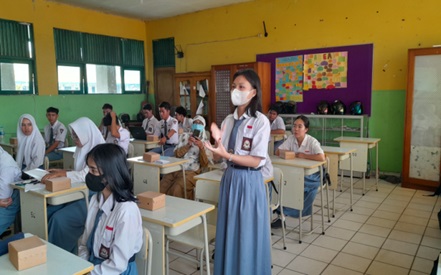Peningkatan Pemahaman Siswa Mengenai Pengaruh Media Sosial terhadap Radikalisme di Kalangan Pelajar melalui Penyuluhan Hukum tentang Paham Radikalisme Increasing Student’s Understanding Regarding the Influence of Social Media on Radicalism among Students through Legal Education Regarding the Understanding of Radicalism
Main Article Content
Abstract
Social media is one of the tools currently very close to people's lives. All aspects of human life cannot be separated from social media. Students are one of the users of social media. Through social media, students can access knowledge not obtained at school. Social media is also used to spread radicalism among the younger generation, especially students. Social media is used as a tool for radicalization by individuals and groups for political and social change, especially for teenagers and the younger generation. Seeing the high rate of spread of radicalism among teenagers, especially students, through social media shows the importance of knowledge and understanding for teenagers regarding the spread of radicalism through social media. There is a lack of knowledge among teenagers regarding the dangers of spreading radicalism through social media, so it is necessary to make efforts in the form of promotive external support in the form of Legal Counseling in schools, with the main target being students.
Downloads
Article Details

This work is licensed under a Creative Commons Attribution-ShareAlike 4.0 International License.
Authors who publish with this journal agree to the following terms:
- Any article on the copyright is retained by the author(s).
- Author grant the journal, right of first publication with the work simultaneously licensed under a Creative Commons Attribution License that allows others to share work with acknowledgment of the work authors and initial publications in this journal.
- Authors are able to enter into a separate, additional contractual arrangements for non-exclusive distribution of published articles of work (eg, post-institutional repository) or publish it in a book, with acknowledgment of its initial publication in this journal.
- Authors are permitted and encouraged to post their work online (e.g., in institutional repositories or on their websites) prior to and during the submission process, as can lead to productive exchanges, as well as earlier and greater citation of published work.
- The article and any associated published material is distributed under the Creative Commons Attribution-ShareAlike 4.0 International License
References
Chan, 2021. Intensitas Mengakses Media Sosial Dengan Perilaku Phubbing Pada Mahasiswa. Psikoborneo:Jurnal Imiah Psikologi. 9(3): 519-527. http://dx.doi.org/10.30872/psikoborneo.v9i3.6496
Chantika, P. D, 2018. Hubungan intensitas penggunaan media sosial LINE dan motivasi belajar dengan prestasi belajar. Journal UNDIP, 6(3): 1-12.
Departemen Pendidikan dan Kebudayaan, Kamus Besar Bahasa Indonesia. Jakarta: Balai Pustaka, 1990.
Fahmi Rahman (2023), diakses melalui https://www.kompasiana.com/fahmirahmaaan/63f9545f08a8b51a88744ec2/penyalahgunaan-media-sosial-pada-remaja.
Ghifari, Iman Fauzi. 2017. Radikalisme Di Internet. Religious: Jurnal Agama dan Lintas Budaya, 1(2): 123-134.
https://news.detik.com/berita/d-4184478/mantan-menteri-ini-ungkap-alasan-anak-muda-jadi-target-radikalisme. Diakses tanggal 11 September 2023
Ina Magdalena,; et.al. 2021. Analisis Penggunaan Teknik Pre-Test Dan Post-Test Pada Mata Pelajaran Matematika Dalam Keberhasilan Evaluasi Pembelajaran di SDN Bojong 04, Nusantara : Jurnal Pendidikan dan Ilmu Sosial, 3(2):150-165.
Iqbal, Muhammad,; et.al. 2021. Resiko Radikalisme Menyasar Kalangan Remaja Melalui Media Sosial. Pro Bono: Jurnal Pengabdian Kepada Masyarakat, 1(2): 117-118. http://dx.doi.org/10.24014/jp.v17i1.10897
Katadata, 2022. https://databoks.katadata.co.id/datapublish/2022/06/10/penetrasi-internet-di-kalangan-remaja tertinggi-di-indonesia
Kementerian Agama RI. 2014. Radikalisme Agama dan Tantangan Kebangsaan. Jakarta: Dirjen Bimbingan Agama Islam.Kementerian Agama RI.
Riyadi, Hendar. (2016). Koeksistensi damai dalam masyarakat muslim modernis. Wawasan: Jurnal Ilmiah Agama dan Sosial Budaya, 1(1): 18, http://dx.doi.org/10.15575/jw.v1i1.575
Wahid Foundation, 2016.RI Masih Rentan Intoleransi, Wahid Foundation Sampaikan Enam Rekomendasi. http://wahidfoundation. org/ index.php/news/detail/RI- Masih-Rentan-Intoleransi-Wahid-Foun-dation-Sampaikan-Enam-Rekomendas .August 2016
